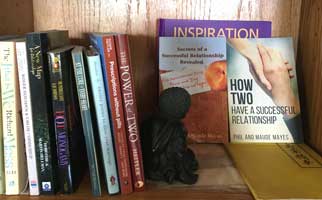Successful Relationship Reading Corner
 This week we blogged on the truth of the "we" at the core of relationships. Here are some fascinating articles sharing studies about the use of "we" versus "I" in relationships. This week we blogged on the truth of the "we" at the core of relationships. Here are some fascinating articles sharing studies about the use of "we" versus "I" in relationships.
How to Improve Your Relationship With One Simple Word "... check this out: Researcher Robert Levenson and colleagues at University of California, Berkeley, have been eavesdropping on our relationships and found couples who use the word "we" when talking, especially about difficult things, are happier, calmer, exhibit more positive emotional behavior, have less negative automatic arousal (i.e. heart pumping adrenaline and anxiety) and in general are more satisfied with their relationships (think: affection, respect, intimacy) than couples whose communication is more populated by the pronouns you, me and I. "
"We" vs. "Me" Couples "The 'we' couples take themselves less seriously. They don't imagine they can be perfect and are unsurprised when things don't go swimmingly. Rather than a 'here we go again, the universe hates me,' when the car is stolen, a 'we' couple will quickly bemoan the fact that this happened to 'us' and move on. Of course cars get stolen, it happens every day. He files the police report, she arranges a rental. They get to work on time and the flow of life continues. 'Me' couples blame each other (I told you we shouldn't have parked here. Why did you open an account in a bank here? It's a crummy neighborhood). They storm off, they don't resolve the issue quickly, they don't get to work and they have more problems as the newest spiral downward commences."
Love's Language: Couples who say 'we' happier "Previous studies have indicated that use of inclusive pronouns that include 'we,' 'our' and 'us' — versus 'I,' 'me' and 'you' — are evidence of marital satisfaction in younger couples like Sievwright and hubby Dane, both of whom are 27. The latest work, in the September issue of the journal Psychology and Aging, carries the link forward to more established pairs when conflict bubbles, and reports evidence of more relaxed heart rates and blood pressure among those with the highest 'we-ness' quotients. 'We found more 'we' language in older couples and in happier couples,' said Robert Levenson, the study's senior researcher at the University of California, Berkeley."
|
|